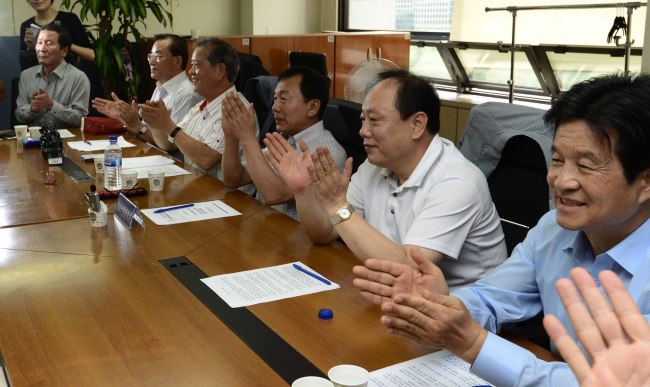[Newsmaker] Gaeseong accord not entirely promising
By Shin Hyon-heePublished : Aug. 15, 2013 - 21:04
By Shin Hyon-hee
Despite the breakthrough in Gaeseong, the two Koreas faced a series of tough talks to sort out differences over the industrial park’s globalization, compensation for businesses and other thorny issues.
At the core of the consultations will be an envisioned joint committee to run the factory zone based on consensus, designed to block the North from making unilateral decisions such as its April entry ban and pullout of workers.
During the seventh meeting in Gaeseong on Wednesday, the two sides promised to meet again “in the near future” to form the panel to discuss compensation for firms and ways to improve passage, communications and customs and how to protect South Koreans’ assets in the border city.
Despite the breakthrough in Gaeseong, the two Koreas faced a series of tough talks to sort out differences over the industrial park’s globalization, compensation for businesses and other thorny issues.
At the core of the consultations will be an envisioned joint committee to run the factory zone based on consensus, designed to block the North from making unilateral decisions such as its April entry ban and pullout of workers.
During the seventh meeting in Gaeseong on Wednesday, the two sides promised to meet again “in the near future” to form the panel to discuss compensation for firms and ways to improve passage, communications and customs and how to protect South Koreans’ assets in the border city.

Infrastructure improvement is key to “globalizing” the business district, which President Park Geun-hye vowed while on the campaign trail.
Under a five-point accord signed at the close of the talks, the two sides will “ensure international-standard conditions for business and develop the park into a globally competitive industrial complex.”
It called on them to actively attract foreign enterprises to Gaeseong, improve rules on labor, tax, wage and insurance to the “international level,” craft incentives such as lower tariffs for exports, and hold briefing sessions for overseas investors.
Pyongyang apparently made concessions by agreeing to the globalization part, while Seoul compromised on the core issue of how to avoid another closure by accepting “joint” safeguards. It previously insisted on Pyongyang’s unilateral assurances that it would not shut off the district again.
Businesses running plants there have long complained about three-day advance notice for entry, a lack of wireless communications and Internet services, and time-consuming customs clearance, among other issues.
By housing foreign companies in Gaeseong, Seoul officials are hoping to reform regulations and safeguard against another suspension of the park.
But though they reached agreement after a string of ups and downs during the 40-day negotiation process, it did not contain any concrete measures to resolve tricky issues but shifted burdens to the yet-to-be-launched committee, critics say. They have also raised concerns about wage hikes and labor unions as potential side effects.
A true globalization appears to be a remote future. Considering the North’s pullout of workers and entry ban amid a torrent of threats of nuclear attack, the Gaeseong complex will need sweeping reform of regulations and infrastructure, as well as incentives lucrative enough to tempt entrepreneurs from overseas and hedge against the risks they would face.
(heeshin@heraldcorp.com)








![[Today’s K-pop] BTS pop-up event to come to Seoul](http://res.heraldm.com/phpwas/restmb_idxmake.php?idx=644&simg=/content/image/2024/04/17/20240417050734_0.jpg&u=)

![[Graphic News] More Koreans say they plan long-distance trips this year](http://res.heraldm.com/phpwas/restmb_idxmake.php?idx=644&simg=/content/image/2024/04/17/20240417050828_0.gif&u=)





![[KH Explains] Hyundai's full hybrid edge to pay off amid slow transition to pure EVs](http://res.heraldm.com/phpwas/restmb_idxmake.php?idx=652&simg=/content/image/2024/04/18/20240418050645_0.jpg&u=20240419100350)

